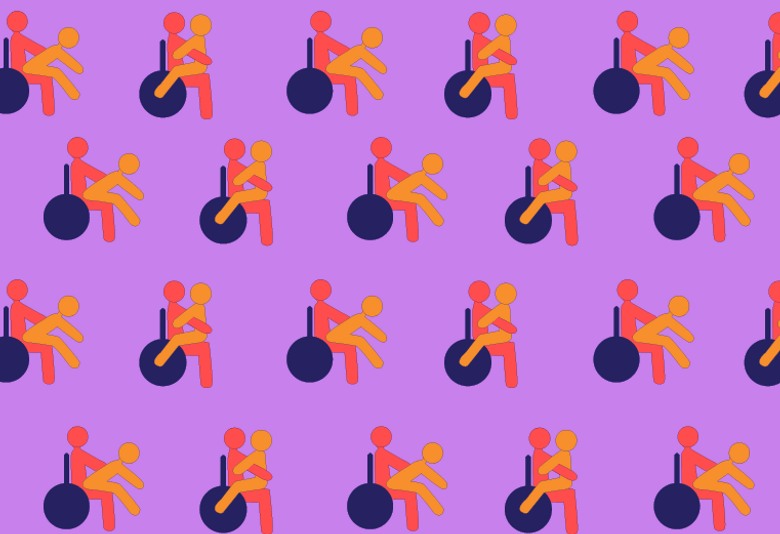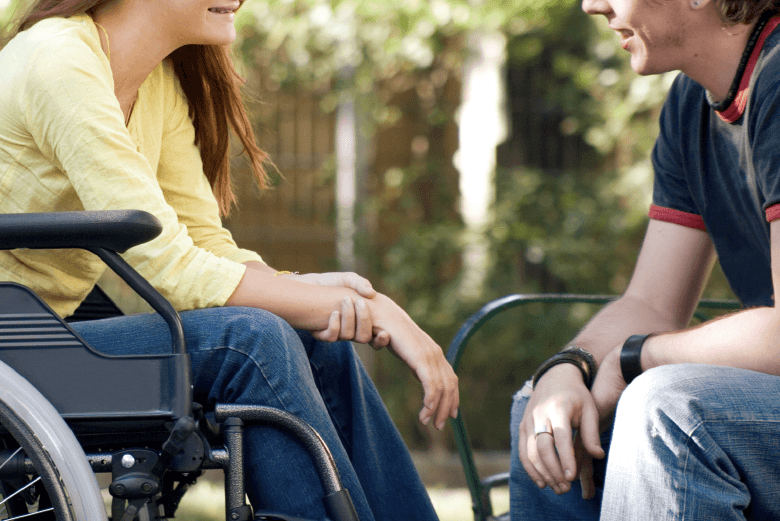One of the main challenges with her was communication; she didn’t speak, but her eyes were so expressive that it was only a matter of time before we managed to connect. To this, we added a rudimentary idea that allowed me to get limited yes or no answers.
In one of many sessions, we asked her, with the help of cards with pictures (pictograms), if she was a girl, a teen, an adult or an old woman. Her eyes immediately went straight to the card that represented the girl, despite her age.
The following sessions were dedicated to talking about the features of adolescence. I will never forget the sparkle in her eyes when she identified with everything we mentioned.
When we repeated the question, “Are you a girl, a teenager, an adult or an old woman?” her response was immediate: “teenager”.
We used the same technique to explain to her what it feels like when “you like a guy”, again, words were not necessary to explain everything that her eyes expressed. Letting her parents know that their disabled daughter liked a guy from the same center was a totally new but very rewarding experience for me; although, recognizing that all issues related to sex education were left out in the intervention was disappointing.
Did no one realize that these girls were growing up? What were we doing to ensure they had a fulfilled adolescence and adult life?
The perception of sexuality with a disability
We go through life with a lens that stops us from seeing beyond disability. We deny ourselves the opportunity to know and connect with a person, to the point that we have come to believe that certain people, due to their life conditions, will never experience the desires and needs that those without disability do, so we deny them the opportunity of (re)knowing themselves and to live and feel like people with rights.
Within the Convention on the Rights of Persons with Disabilities (CRPD) there are articles about sexuality issues, such as Article 16 that refers to protection against exploitation, violence, and abuse; the relevance of this article is not what it mentions about the protection that people with disabilities should receive, but that it considers it essential to provide them with information so they can prevent and recognize any type of sexual violence and inform others (1).
Another important article is Article 23 about home and family. This article recognizes the decision to marry, the number of children desired, time gaps between each child, and the right to maintain fertility. The fact that basic rights like these should be mentioned within the convention allows us to realize how violated the rights of people with disabilities are and that despite the fact that in the current historical context we are looking for a human rights perspective, segregation and discrimination still persist nowadays, such as considering disabled women as asexual beings that do not have the ability to make decisions regarding their sexuality and reproduction.
A better approach towards sexuality and disability
There is a long way ahead of us regarding comprehensive sexual education for those living with disabilities.
It is important to mention that comprehensive sexual education and sexual and reproductive health in Mexico are out of reach for disabled women, and whatever is done is aimed at preventing them from having children and/or fully enjoying their sex lives. These topics are never discussed, and very few parents consider the comprehensive sexual health of their disabled children important; most of them are “content” with preventing or keeping their children from behaviors that may be uncomfortable, such as masturbating in public.
“You know, I was her age when I had my first boyfriend, but it never crossed my mind that I had to worry about these things with her”. These were her mom’s words. I then understood that it is not always easy to empathize with those who live with disabilities, but it is not impossible either.
We owe disabled girls, teens, and women, and this debt is not going to be paid by planning nice infantilized events because our idea of disability makes us believe that their taste will always be childish. It is necessary to start seeing them as sexual beings with their own tastes and desires, and it is also necessary to offer them information through suitable media. It is essential to create spaces for them to be heard and learn to respect their decisions so the eyes of more girls, teens, and women shine whenever they are heard, acknowledged, and respected, regardless of their life conditions.
Sources
(1) “Convention on the rights of persons with disabilities.” United Nations, www.ohchr.org/en/instruments-mechanisms/instruments/convention-rights-persons-disabilities. Accessed January 2023.
Note: If you want to obtain more information related to sexuality and contraceptives, you can visit our blog.
About the author: Mirelle Rosales. Feminist psychologist. Abortion doula. Shares life with three pampered dogs.
Do you have something to share? Leave your comments below, contact us on our social media platforms: Facebook, Instagram, Twitter, YouTube and TikTok, send us an email to info@findmymethod.org. For more information on contraception, visit findmymethod.org.

